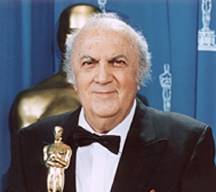
 Federico
Fellini (1920-1993), Italian film director, noted for such films
as La Strada (1954) and 8-1/2 (1963). He was born in Rimini. In 1938 he
left his birthplace for Florence and Rome, where he worked as a writer
and cartoonist and toured with a theater company. One of his first significant
film ventures was a collaboration with the Italian film director Roberto
Rossellini on the script of Open City (1945). Fellini then worked as a
screenwriter and assistant director on several films before codirecting
Variety Lights (1951) with Alberto Lattuada. He then directed The White
Sheik (1952). Although these first two films were unsuccessful, his next
film, I Vitelloni (1953) won international acclaim. It was the first of
his probing, neorealistic studies of young drifters, circus people, and
prostitutes. La Strada and Nights of Cabiria (1957), both starring his
wife, Giulietta Masina, won Academy Awards for best foreign film. Fellini's
subsequent films became more autobiographical and surrealistic, often
incorporating spectacular and grotesque elements and forsaking linear
narrative, to express subjectively the characters' experiences and thoughts.
He usually has written or cowritten his screenplays. The films 8-1/2 and
Amarcord (1974) won two more Academy Awards for best foreign film. The
former portrays a filmmaker's quest for self-understanding; the latter
reflects Fellini's childhood memories. Among his other films are La Dolce
Vita (1960), Juliet of the Spirits (1965), Fellini Satyricon (1969), The
Clowns (1970), City of Women (1981), And the Ship Sails On (1983), and
Ginger and Fred (1986).
Federico
Fellini (1920-1993), Italian film director, noted for such films
as La Strada (1954) and 8-1/2 (1963). He was born in Rimini. In 1938 he
left his birthplace for Florence and Rome, where he worked as a writer
and cartoonist and toured with a theater company. One of his first significant
film ventures was a collaboration with the Italian film director Roberto
Rossellini on the script of Open City (1945). Fellini then worked as a
screenwriter and assistant director on several films before codirecting
Variety Lights (1951) with Alberto Lattuada. He then directed The White
Sheik (1952). Although these first two films were unsuccessful, his next
film, I Vitelloni (1953) won international acclaim. It was the first of
his probing, neorealistic studies of young drifters, circus people, and
prostitutes. La Strada and Nights of Cabiria (1957), both starring his
wife, Giulietta Masina, won Academy Awards for best foreign film. Fellini's
subsequent films became more autobiographical and surrealistic, often
incorporating spectacular and grotesque elements and forsaking linear
narrative, to express subjectively the characters' experiences and thoughts.
He usually has written or cowritten his screenplays. The films 8-1/2 and
Amarcord (1974) won two more Academy Awards for best foreign film. The
former portrays a filmmaker's quest for self-understanding; the latter
reflects Fellini's childhood memories. Among his other films are La Dolce
Vita (1960), Juliet of the Spirits (1965), Fellini Satyricon (1969), The
Clowns (1970), City of Women (1981), And the Ship Sails On (1983), and
Ginger and Fred (1986).
(Source: Microsoft¨ Encarta¨ Online Encyclopedia 2000 © 1997-2000 Microsoft Corporation. All rights reserved.)